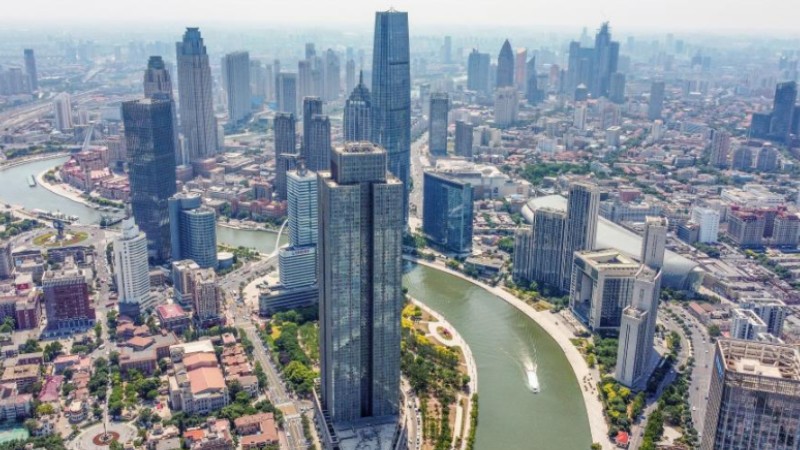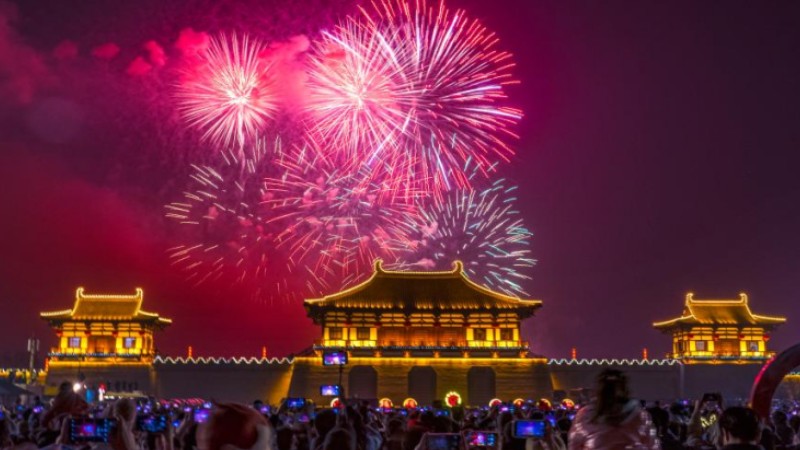First-store economy thrives across China
Various parts of China have been working on their first-store and first-launch economies in recent years to stimulate consumption growth.
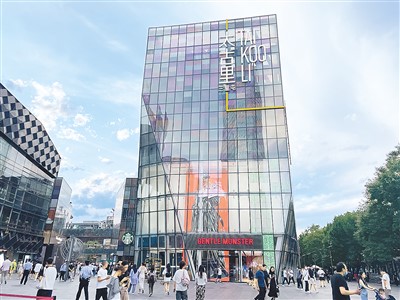
Photo shows Sanlitun, a popular shopping area in Beijing. (People's Daily Overseas Edition/ Ye Zi)
“First-store economy” is a kind of real economy that features the opening of first brick-and-mortar stores of brands in specific areas. The concept also includes the launch of first stores of brands that operate under an innovative model.
According to the Shanghai Municipal Commission of Commerce, a total of 375 first stores opened in Shanghai in the first four months of the year, of which four were the world's or Asia's first and 52 were the first in China. Statistics from Data Quest Data, a big data application service provider, indicated that Shanghai had 1,073 first stores in 2022, ranking first nationwide. From the beginning of 2018 to the end of 2022, Shanghai introduced 4,881 first stores of various domestic and foreign brands, with an average of 2.7 new ones every day.
Since the beginning of the Shanghai Global New Product Debut Season in May, the metropolis has seen over 150 brands open their first stores or flagship stores, 284 of China's time-honored brands launch new products themed on Guochao - a consumer trend that translates as “China-chic” - and over 20 exhibits showcased at the China International Import Expo (CIIE) enter the city’s market for the first time. During the same period, it has held more than 320 debut events for domestic and foreign brands.
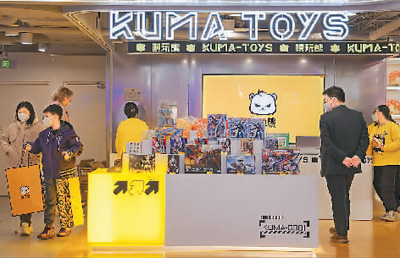
Photo shows Bailian ZX Mall in Shanghai. (Photo/Wang Chu)
During the Shanghai Global New Product Debut Season, Lin Qingxuan, a cosmetic brand from Shanghai, opened a pop-up shop covering six square meters on Wujiang Road. In just one hour after opening, over 50 orders of new products were placed. "With the help of the Shanghai May 5 Shopping Festival, our company opened up both online and offline channels for the new products, and took the lead in some of the categories of online sales volume," explained Sun Laichun, founder of the brand. Sun added that the city built a good platform for brands, while the brands rolled out new products at the best time, helping them boost their international influence.
In the first quarter of the year, a total of 26 first stores opened in 15 shopping centers in key business areas of Guangzhou, capital of south China's Guangdong Province, and key business areas of Shenzhen city in the province witnessed 46 new first stores.
China's retail giant JD Group opened a JD Mall, a shopping complex, in Dongguan city of Guangdong on June 17. The shopping center, the first JD Mall in south China and the Guangdong-Hong Kong-Macao Greater Bay Area, and also the largest first store in Dongguan, has a business area of over 50,000 square meters, and brings together restaurants and stores offering home appliances, household supplies, digital products, sports and outdoor equipment under one roof.
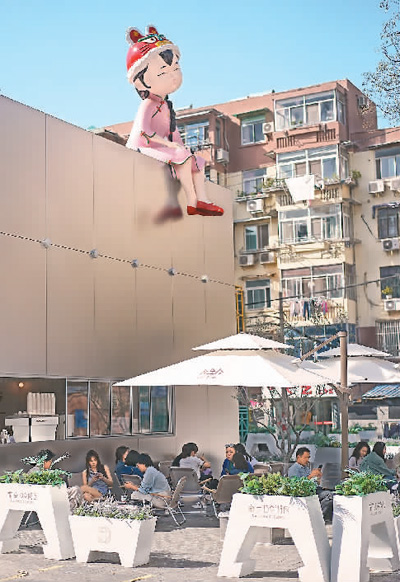
People enjoy themselves at a cafe of the D9 block, a cultural tourism consumption project built on urban industrial remains, in Xuanwu district of Nanjing, east China's Jiangsu Province. (Xinhua/Ji Chunpeng)
During the January-May period of the year, 403 brands opened their first stores in Beijing, with 37 being the first stores of the Chinese mainland, and 366 being the first stores of the city. The catering industry makes up the largest share, accounting for 63 percent of all these stores, and is followed by the retail sector.
In addition, over the last two years, over 300 first stores of all kinds entered Wuxi, east China's Jiangsu Province, while the province’s Suzhou city saw the number of such stores increase by 211.3 percent in the last four years.
During the Suzhou Debut Stores Economy, Development Conference, which was held in May this year, 19 first-store projects were inked, involving brands such as OTB Group, an Italian multinational fashion group, fashion label AMI Paris, Bulgarian shoe brand BY FAR, fragrance brands Penhaligon and L'Artisan Parfumeur, and Xtep, a Chinese sportswear brand.
Chengdu, capital city of southwest China's Sichuan Province, saw 177 new first stores in the first four months of the year, of which 41 were the first in southwest China and 19 were the first in the Chinese mainland. The city had 708 first stores in 2022, and over 2,500 in the last five years, ranking third across the country, according to a report of brand debuts in Chengdu.
These shops are proving popular among customers. One said, "I have followed the brand closely for a long time. Now it is opening the first store in China, so I came here to have a look." Some were attracted by the stylish design and others come to these stores because they have gone viral on social media platforms.
Compared to regular stores, first stores have a certain novelty value, are more fashionable and always offer more high-quality products, and are therefore better at catering to consumers looking for unique and quality commodities.
Global home furnishing giant Ikea opened its first store in Hefei, capital of east China's Anhui Province, at the end of last year. Since then, it has enjoyed huge popularity among consumers. A woman surnamed Li was attracted by a limited edition product. "I've never seen a purple BILLY Bookcase before and I love it to bits," she said.
Fashion brand ITIB made its debut in Chaoyang Joy City in Beijing in April. "As the capital, Beijing is one of the cities that are high on the agenda of our company," explained an executive of the store. The shop’s sales on its opening day exceeded 250,000 yuan (about $34,660).
Furthermore, many first stores no longer simply offer products and services for consumers, but also have innovative designs and layouts, and hold exhibitions and performances. In the metaverse digital photo studio of UNICLONE in Chaoyang Joy City, the first of its kind in China, a number of customers are busy creating digital images of themselves. After facial scanning and computer modelling, customers can work with stylists on the details of the images, such as hairstyles and clothing. "Since the store opened more than a month ago, our shop has offered brand new experiences for consumers. Many of the visitors were from different industries. Through exchanges of ideas and concepts, we had many sparks of genius," a manager of the store said.
Sheng Lei, a researcher at the Institute of World Economy of the Shanghai Academy of Social Sciences, said that the internal impetus and core competitiveness of the first-store economy come from innovation of product, technology, and business model, which bring consumers fresh consumption experiences and enjoyment, help stimulate consumption vitality, brand value and cultural connotation and also drive economic growth. As these stores accumulate, they can help drive the emergence of new consumption growth drivers, promote the upgrading of consumption structure and even the transformation of urban functions. High-level first stores and their commercial areas can help increase footfall, which will in turn attract more well-known brands.
To boost the first-store and first-launch economies for high-quality development, many regions have rolled out favorable policies such as providing financial support, establishing green channels, and improving business environment. A catering company in Qingdao in east China's Shandong Province recently received a 300,000-yuan reward for opening its first store in the city, bolstering the brand's confidence. Moreover, the city also stepped up efforts to promote first stores on short-video platforms and social media networks.
Photos
Related Stories
Copyright © 2023 People's Daily Online. All Rights Reserved.






